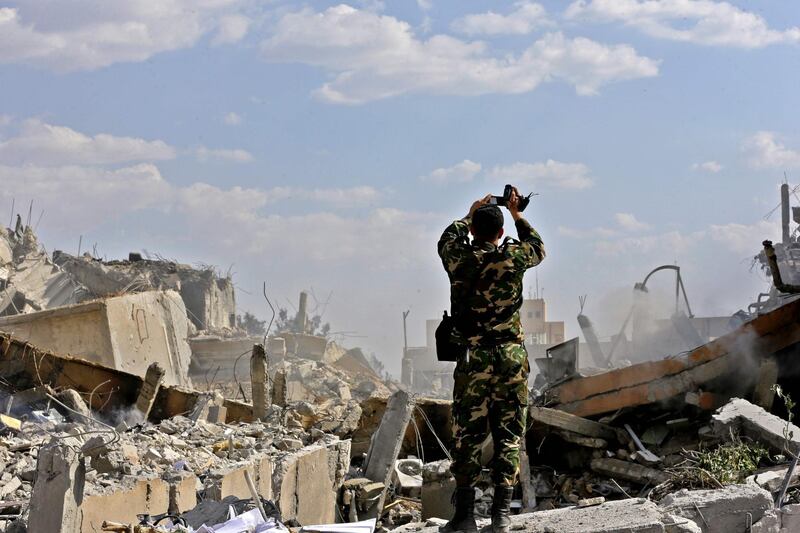Carl von Clausewitz, the German military thinker and theorist, famously said “war is the continuation of politics by other means”. The combined US, French and UK attack on Syrian chemical weapons facilities on the night of April 13 is a perfect example of this adage. The strikes were political in nature and designed to send a simple message: do not use chemical weapons on civilian targets.
Although quite significant given the ordnance expended – hundreds of missiles at first count – the strike did not change an iota on the ground. The allies did not bomb any of the Syrian military installations, airbases, barracks or hardware, such as tanks, that could have enfeebled Bashar Al Assad’s ability to fight what is left of the insurgents.
Instead, they deliberately struck targets which they said were designed to degrade Syria's chemical arsenal. In so doing, they also avoided entangling themselves with Russians and Iranians, whose heavy presence could have inflicted casualties that would have unnecessarily risked a wider conflict.
Politics played a role in the multinational aspect of this assault. From an American perspective, the attack had to happen; the US establishment had rhetorically committed itself to taking action, especially after the April 2017 raid.
Unlike last year, President Donald Trump could not this time afford to act unilaterally again. Given his cascading problems at home with a variety of scandals, a solo American attack would have had no credibility as most observers, including those in the Middle East, the main audience, would have interpreted it as a deliberate diversionary effort. The need to enlist France and the UK meant that the scope of the raid had to automatically be limited to a political message.
In this, the French and British had the US Department of Defence on their side. Moreover, the allies appear to also have Nato's backing, including the Turks, who recently had been cosying up to the Russians and Iranians in Syria.
What is also of note are the very deliberate statements made by British Prime Minister Theresa May, French President Emmanuel Macron and US Secretary of Defence James Mattis when they acknowledged the strikes.
Mrs May emphasised that this was not “about regime change”, drawing clear political lines while Mr Macron, in an allusion to Barack Obama’s failed decision in 2013, argued that “a red line had been crossed”, thus not only articulating the justification but also setting a clear benchmark for future action. In other words, Mr Macron was indicating were the Syrian regime not to get the message and once again engage in the use of chemical weapons then the allies would strike again, perhaps this time with regime targets in their sights. Finally, Mr Mattis made reference to the Geneva process: that is, the international effort to construct a political solution, as the way forward.
Coordinated or not, rarely have we seen three leaders express such clear political goals. Mr Trump, on the other hand, may have temporarily distracted the public's attention from his problems but this is unlikely to last and hence will be seen as inconsequential in this regard.
The larger picture in Syria, however, does not get altered by these strikes. There is no allied strategy in Syria. Washington in particular is in a state of chaos and confusion when it comes to Syria. Mr Trump, for reasons that are unclear to many, only 10 days ago intimated that he wanted the US contingent in eastern Syria removed, and quickly. It is only after a pushback from the Pentagon and Centcom that he modified his request and extended his deadline.
The Defence Department sees its mission as defeating ISIS, whose remnants are still scattered throughout the region amid fears that a precipitous withdrawal will enable its rejuvenation.
It is also solicitous of its allies, the Kurdish-led Syrian Democratic Forces (SDF), who sacrificed many lives in this fight. Beyond these narrow objectives lie a discussion on whether the American presence in Syria could be marshalled to prevent the completion of the materially unimportant but symbolically crucial Tehran-Baghdad-Damascus-Beirut highway, or land bridge, that would signify a regional victory for Iran.
The US-SDF alliance, which controls as much 20 or 25 per cent of Syrian territory, although sparsely populated, is a potential tool Washington has to influence the final political outcome in Syria. It is possible that with the arrival the new national security adviser John Bolton and eventual confirmation of the new Secretary of State, Mike Pompeo, US policy will acquire more clarity and coherence.
By admitting that the raid’s intent was not “regime change”, the allies have reluctantly conceded the reality on the ground: Mr Al Assad is not going anywhere and is likely to reassert his total control over most of Syria, barring an unexpected development.
Paradoxically, other than the Russians and the Iranians, two actors have the potential to change the course of events. The first is Mr Al Assad himself. Were he to use chemical weapons again, the next attack might be debilitating to the regime itself.
The other – or others, to be more precise – are the regional players. Their strategy to date, which was crystallised in the early days of the Arab Spring, has not produced the desired results. It is time for a rethink; the human calamity that is Syria will not abate, especially as Mr Al Assad seeks to permanently rid himself of many of the refugees in neighbouring countries and beyond.
Henri Barkey is professor of international relations at Lehigh University in Pennsylvania and a senior fellow for Middle East Studies at the Council on Foreign Relations





